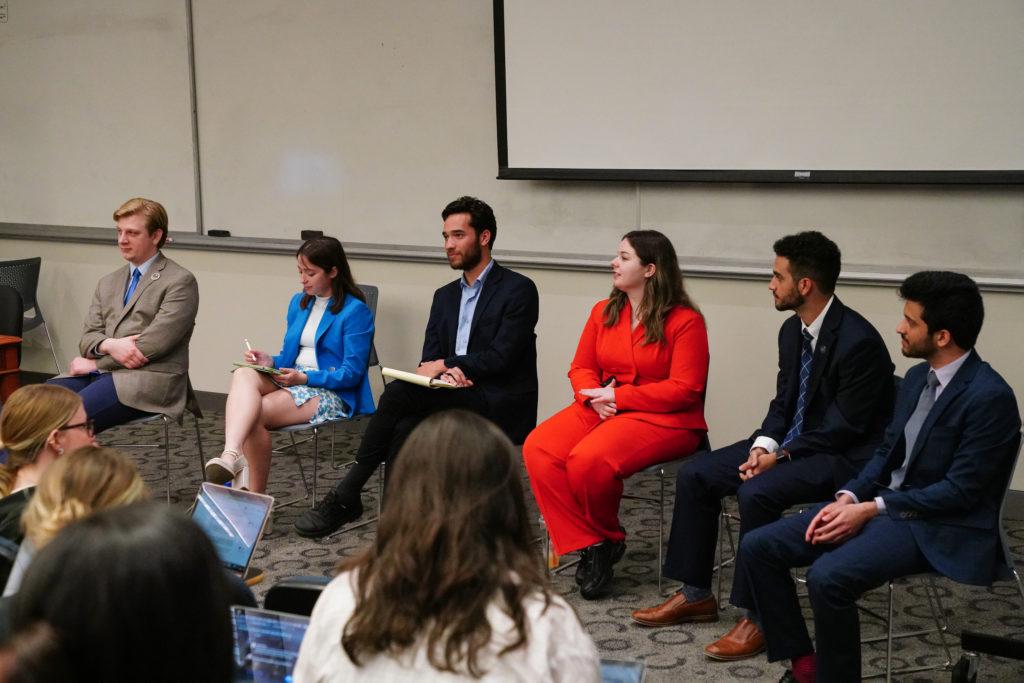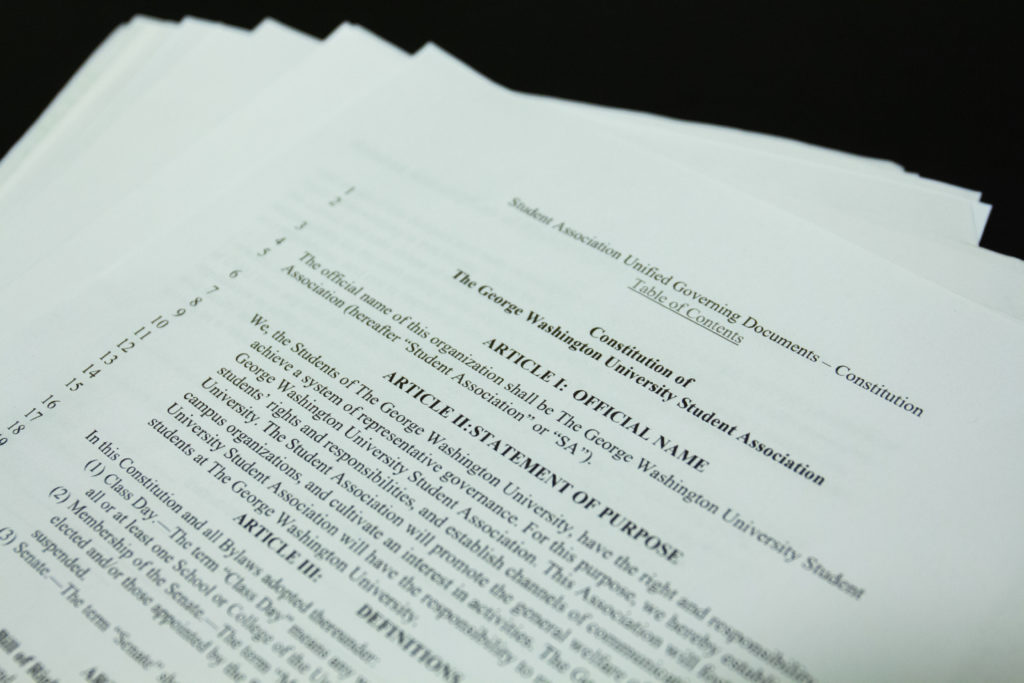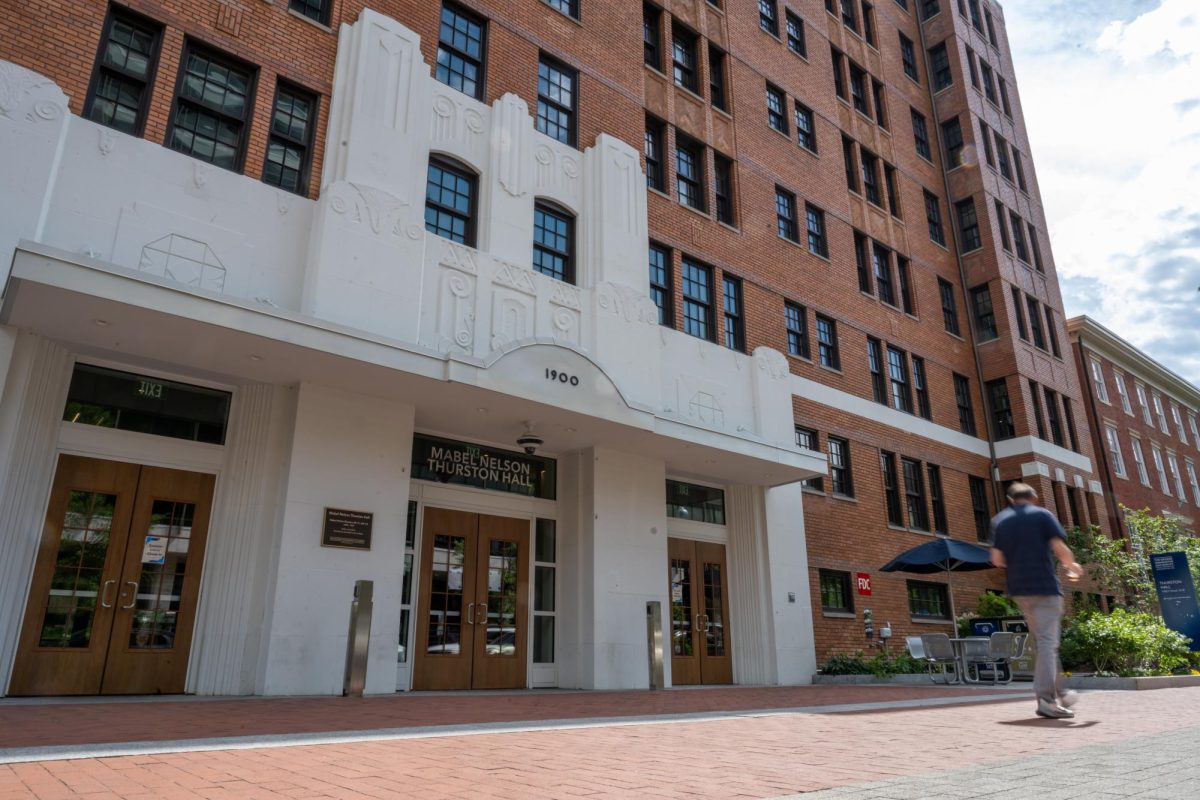With the 2023 Student Association elections around the corner and candidates vying for your attention, you might be wondering how to cast your vote.
The two-day election Thursday and Friday will give students the opportunity to elect their next president, vice president and senators. The ballot will also include a referendum that, if passed, will amend the SA Constitution, rephrasing the document for clarity and tightening language about various protocols, including votes to remove the SA president.
Here’s everything you need to know:
When is voting?
Voting opens Thursday at 9 a.m. and closes Friday at 9 p.m. The voting period was initially set to begin April 5, but last month the Joint Elections Commission delayed the elections after disqualifying two presidential hopefuls and a senate candidate from the race because of issues with their petition signatures.
How can I vote?
The ballot will be available at the top of the GW Engage website Thursday and Friday.
What is the election for?
This election is for students to choose a president, vice president and senators in the Student Association, the University’s main student governing body. The SA is composed of the executive branch, the senate and the Student Court. The SA connects and represents students to administrators and allocates a $1.31 million budget between student organizations.
Who is running?
This year’s SA presidential candidates include Residence Hall Association President Arielle Geismar, SA Executive Chief of Staff Keanu Rowe, Sen. Rami Hanash Jr., GWSB-U, and former executive branch staffers Nathan Orner and Edy Koenigs.
SA Senate Chairperson Pro Tempore Demetrius Apostolis, CCAS-U, and SA Treasurer Arya Thakur are going head to head in the race for vice president.
Fourteen candidates are running for the 41 open SA Senate seats. All senate races are uncontested.
What is the JEC?
The Joint Elections Commission is responsible for organizing all campus-wide elections for the SA. The JEC responds to and investigates complaints of wrongdoings during the election process while working to ensure impartiality and equality for both candidates and voters in campaign and election policies. The JEC acts independently from the SA, though the president appoints JEC members and the senate confirms them.
Can I write in a candidate?
Yes, voters are allowed to write in candidates. Mohamed Redzuan Bin Mohamed Raffe, the vice president of external relations for GW’s Entrepreneurship Club, is running as a write-in presidential candidate after the JEC ruled he didn’t earn enough signatures to qualify for the ballot, and sophomore Aidan Spencer and junior Rafael Wexler are running as write-in senate candidates for the CCAS-U and ESIA-U races, respectively.
What rules must the candidates abide by during their campaigns?
Candidates must adhere to strict rules regulating the posters, cards and other marketing materials they distribute during campaign season. The JEC must approve all posters, which must include the JEC logo. Candidates can only hang posters in designated areas, like the exterior of Academic Center buildings and the exterior of the University Student Center on the H Street side.
Candidates for SA president and vice president can spend up to $300 on their campaign, while those running for senate seats can spend up to $100 of their personal funds. Candidates must also submit a financial expenditure report to the JEC at the end of the election, detailing all materials purchased during the campaign season. Candidates must disclose any donations they receive to the JEC in a donor-contributions report, which includes the names, monetary amounts and dates of all contributions.
What are the responsibilities of the president and vice president?
The SA president meets with administrators, represents students in University proceedings, like Board of Trustees meetings, and controls the executive branch, which accomplishes projects the president selects. The president can also sign executive orders to enact policy unless the senate votes to overturn them.
The vice president is the presiding officer of the senate and is responsible for running senate meetings. The vice president can also appoint members of the senate staff.
What are the responsibilities of SA senators?
Students from each GW school elect their respective senators, who meet every other week to draft bills and resolutions pertaining to constituents’ interests. The senate converts vacant seats to undergraduate-at-large and graduate-at-large seats, which represent all undergraduate students and all graduate students, according to the SA constitution. Senators vote to approve candidates who apply to fill vacancies, the constitution states. Senators vote on proposed legislation, allocate funding to student organizations and work on policy projects.
Are SA members paid?
The University provides a scholarship totaling $11,250 each for both the president and vice president. No other SA members are paid.
What referendum is on the ballot?
The senate approved a referendum last month, sending a series of constitutional amendments to students for a vote in the upcoming elections. The referendum, if approved, would rephrase parts of the SA constitution pertaining to the SA’s inner workings. The amendments would remove the chief of staff from the executive cabinet, rendering the position ineligible to vote on the SA president’s removal. Removal of the president is a power that would be limited to the SA’s executive cabinet, according to the proposed amendments. Read a more in-depth explainer of the referendum here.
How does ranked-choice voting work?
The JEC conducts ranked-choice voting for all elections of a single seat. Students rank candidates in order of their preference. Candidates with the fewest first-choice votes are eliminated from the first round of tallying the results, and their votes are redistributed to voters’ “next-ranked candidate.” The JEC eliminates candidates with the fewest votes in each round in descending order of second- and third-choice votes and so on until one candidate reaches 50 percent of the vote, clinching the election.
What has turnout been like over the past few years?
Student turnout for SA elections hit a 10-year low last year, with only 2,690 students, or 10.4 percent of eligible voters, participating in the election. This record low was the culmination of a three-year decline in voter turnout. Students cast 4,727 ballots in 2019, 3,648 in 2020 and 3,246 in 2021.
When will results be announced?
The JEC will announce election results Saturday, April 15 at 5 p.m. in Room 433 of the University Student Center. The results will also be available shortly afterward on the JEC website.











